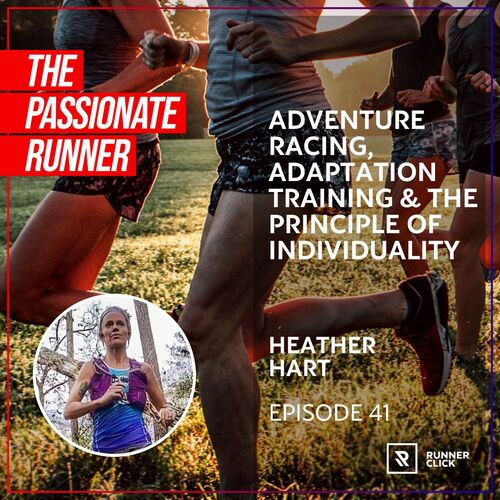
041 Heather Hart - Adventure Racing, Adaptation Training & The Principle of Individuality
Episode · 0 Play
Episode · 48:17 · Jun 14, 2023
About
Heather Hart, ACSM EP-C, is full time running coach, exercise physiologist, certified strength and conditioning specialist, mother of two teenagers, writer, and ultrarunner who believes that ordinary people can achieve extraordinary feats. She is also the co-founder of Hart, Strength and Endurance Coaching and the co-founder of Relentless Forward Commotion, a running resource and strength and run coaching. Today, Whitney and Heather discuss adaptation training, the important role of recovery in getting fitter, and Heather’s passion for helping everyday athletes learn how to balance training for big athletic goals with real life.Episode SponsorRunner Click Pro – https://pro.runnerclick.com/Key Takeaways00:55 – Whitney Heins welcomes Heather Hart to the show to define ‘adventure racing,’ to discuss her experience returning to running postpartum, and to share how she got into run coaching14:20 – From puking after one mile to running adventure racing19:32 – The origin story of Relentless Forward Commotion22:03 – Understanding adaptation training25:15 – Different techniques to bust through a plateau32:47 – Fatigue management and the difference between functional and nonfunctional overreaching36:45 – The benefits of taking extra rest38:59 – The Principle of Individuality41:22 – Listening to your body46:44 – Whitney thanks Heather for joining the showTweetable Quotes“We just like to really work with endurance athletes but really help them focus on all aspects of fitness, and helping them reach their goals.” (14:13) (Heather)“I think all athletes kind of have a progression over time - even if they stay in the same sport - just kinda with what their goals are.” (17:59) (Heather)“So, that’s what so many athletes who come to me, and come to you, and probably every other running coach out there, that’s often what they do is they don’t understand. They say, ‘I’ve been running. I run this far every day and I have for years and I’m not getting better. Maybe I’m getting worse.’ And that’s because there is a ton of science showing how our bodies adapt to exercise and these principles of exercise basically help you understand how you want to build a training plan to reach your goals.” (23:11) (Heather)“I think that coaches and, for lack of a better term, fitness influencers have been doing a great job lately at emphasizing how important rest and recovery days are. Because we know that we don’t make those adaptations during training. It doesn’t happen then. It happens after training, during recovery. So we need to balance out those hard workouts with recovery days so we can actually make those adaptations.” (26:18) (Heather)“Going back to fatigue management, when we’re trying to progressively overload, we do need to do what’s called ‘overreaching.’ And there’s functional overreaching and nonfunctional overreaching. Functional overreaching is purposeful. Nonfunctional is usually what happens to people who just have a chaotic training plan and don’t really take enough rest and they’re getting tired.” (33:40) (Heather)“I would say the number one thing is to remember the Principle of Individuality. Just because you see another athlete - even if they’re training for the same race as you and they have the same amount of experience as you - your body and their body are not the same. Genetically, you’re not the same. Who knows how well your body is recovering compared to that athlete? They may be able to do more than you. You may be able to do more than them. That doesn’t make one right and one wrong.” (40:02) (Heather)“Part of being an athlete is learning your body like that. This is not supposed to be easy.” (43:09) (Heather)“I think that’s part of our job as coaches. A lot of people think...
48m 17s · Jun 14, 2023
© 2023 Captivate Audio Ltd. (OG)